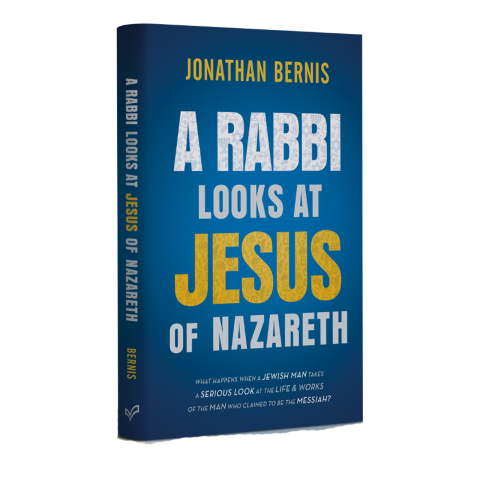
“Daniel 9:24-27 speaks of two anointed ones.”
Answer: “It is possible that the text does speak of two anointed ones, the first in 9:25 and the second in 9:26. This depends on how the seventy weeks of years are divided (see immediately above, 4.20). This does not present a problem, however, since it is clear that (1) if there are two anointed ones, the second anointed one is the Messiah, and (2) the Messianic era had to be inaugurated before the Second Temple was destroyed, thus pointing decisively to Jesus as the key figure of whom the text speaks.” (See Answering Jewish Objections to Jesus, vol. 3, pp. 109-111.)
“Psalm 2:12 should not be translated ‘kiss the Son.’ Only the King James Version and modern Christian fundamentalist translations still maintain this incorrect rendering.”
Answer: “The words “kiss the son” are actually not quoted in the New Testament, but one of the greatest of the medieval Rabbinic commentators, along with some noted, modern Hebrew scholars argued for the ‘kiss the son’ rendering. A good case can be made for this translation. In any case, regardless of the translation of this verse, the psalm is filled with important Messianic imagery.” (See Answering Jewish Objections to Jesus, vol. 3, pp. 111-114.)
“Psalm 16 does not speak of the resurrection of the Messiah.”
Answer: “According to the biblical record, Psalm 16 is a psalm of David in which he expresses his confidence that he will be delivered from death and will not rot in the grave. However, since David did, in fact, ultimately die and see physical corruption, the New Testament learns from this that he was speaking prophetically about his greatest descendant, the Messiah, who would actually be resurrected from the grave.” (See Answering Jewish Objections to Jesus, vol. 3, pp. 114-117.)
Get the "A Rabbi Looks at Jesus of Nazareth" Book
With warmth and transparency, Jewish Voice’s own Messianic Rabbi Jonathan Bernis shares a compelling case for Jesus as Messiah and presents overwhelming evidence that can be traced to the Torah itself.
“Psalm 22 is the story of David’s past suffering. There is nothing prophetic about it.”
Answer: “Actually, Psalm 22 is the prayer of a righteous sufferer, brought down to the jaws of death and then rescued and raised up by God in answer to prayer, a glorious testimony to be recounted through the ages. As such, it applies powerfully to Jesus the Messiah, the ideal righteous sufferer, surrounded by hostile crowds, beaten, mocked, crucified, and seemingly abandoned by man and God, but delivered from death itself and raised from the dead by the power of God, a story now celebrated around the globe. That’s why he quoted words from this psalm with reference to himself when he hung on the cross. How strikingly they apply to him! What is also interesting is that some of the great Rabbinic commentators including Rashi interpreted the psalm as a prophecy of Israel’s future suffering and exile, not as the story of David’s past suffering. Not only so, but a famous Rabbinic midrash composed about 1200 years ago said that David spoke of the Messiah’s sufferings in Psalm 22. We can therefore say with confidence that the application of this psalm to the death and resurrection of the Messiah is in keeping with the clear meaning of the text.” (See Answering Jewish Objections to Jesus, vol. 3, pp. 117-122.)
“Psalm 22 does not speak of death by crucifixion. In fact, the King James translators changed the words of verse 16 [17] to speak of ‘piercing’ the sufferer’s hands and feet whereas the Hebrew text actually says, ‘Like a lion they are at my hands and feet.’”
Answer: “It is interesting to note that verse 16 [17] is not quoted in the New Testament even though other verses from Psalm 22 are cited in the Gospels. This means that verse 16 [17] was not the primary verse on which the New Testament authors focused. As to the allegation that the King James translators intentionally changed the meaning of the Hebrew text, their translation (‘they pierced my hands and feet’ verses ‘like a lion [they are at] my hands and feet’) actually reflects an ancient Jewish interpretation along with some important variations in the medieval Masoretic manuscripts. In other words, it’s as much of a Jewish issue as it is a Christian one! In any case, there really is no problem. With either rendering, the imagery is one of extreme bodily violence done to the sufferer’s hands and feet, corresponding to the realities of crucifixion.” (See Answering Jewish Objections to Jesus, vol. 3, pp. 122-127.)
“Some of the so-called Messianic prophecies in the Psalms actually speak of the psalmist’s sin and folly. How can you apply this to Jesus?”
Answer: “No one tries to apply every verse in each ‘prophetic’ psalm to the Messiah. Rather, there is a simple principle behind the Messianic interpretation of these important psalms: As it was with David, so it is with the Messiah. In other words, there are striking parallels that exist between the life of King David and the life of King Messiah, and it is these parallels that are highlighted in the New Testament’s quotation of certain psalms. For example, just as David was betrayed by one of his closest friends, so also the Messiah was betrayed by one of his closest friends, as noted by Jesus himself (see Psalm 41 and John 13:18). But it is obvious that the details of the betrayal don’t have to be the same (e.g., David was betrayed by Ahithopel, Jesus was betrayed by Judas; David’s betrayal led to his temporary exile; Yeshua’s betrayal led to his death).” (See Answering Jewish Objections to Jesus, vol. 3, pp. 127-129)
“Psalm 40 is absolutely not Messianic in any way.”
Answer: “Did you know that the Talmudic rabbis interpreted all kinds of obscure verses to be Messianic? They saw hints and allusions to the Messiah in hundreds of unusual biblical texts, in passages that are totally unrelated to anything Messianic. In contrast with this, Psalm 40 has some very important Messianic themes.” (See Answering Jewish Objections to Jesus, vol. 3, pp. 129-131.)
“Psalm 45:6[7] does not say that the Messiah is God.”
Answer: “Try this simple test: Write out this verse in Hebrew by itself, give it to anyone who is fluent in biblical Hebrew, and ask him or her to translate the verse. They will say that the meaning of the Hebrew is, ‘Your throne, O God, is forever and ever.’ The Hebrew is quite clear. The problem is that the verse refers in context to Israel’s king, who was human. So, the real question is, ‘How can an earthly king be called ‘elohim?’ The answer is simple: This passage ultimately points to the Messiah, the divine King!” (See Answering Jewish Objections to Jesus, vol. 3, pp. 131-133.)
“Psalm 110 does not say that the Messiah is LORD. Also, the psalm is not written by David about the Messiah. Our traditions indicate that it may have been written by Eliezer about his master Abraham, then added to the collection of the Psalms by David many years later, or it was written by David for the Levites to recite about him (or by a court poet about David). This much is sure: It does not teach that the Messiah is God!”
Answer: “Psalm 110 is an important Messianic psalm pointing to the highly exalted status of the Messiah (to the right hand of God!), and to his priestly and royal nature. For these reasons, it is quoted frequently in the New Testament with reference to Yeshua. Yeshua even quotes it himself, pointing out how the Messiah was greater than David, since David called him ‘my lord.’ However, you are mistaken in thinking that the New Testament (or Christian translations of the Hebrew Bible) make the claim that the opening verse of this psalm means that Jesus is LORD (Yahweh).” (See Answering Jewish Objections to Jesus, vol. 3, pp. 133-145.)
“You claim that Haggai 2 points to the fact that the Messiah had to come before the Second Temple was destroyed, since it says in v. 9 that the glory of the Second Temple would be greater than the glory of Solomon’s Temple. Actually, Haggai is speaking only about the physical splendor of the Second Temple, which surpassed Solomon’s Temple in the days of Herod.”
Answer: “Although there are some clear references in Haggai 2 to an abundance of gold and silver that would be used in rebuilding the Temple, there can be no doubt that the phrase ‘to fill with glory’ refers to the manifest presence of God and not to physical splendor. We can therefore ask, In what way did the glory of the Second Temple surpass that of the First Temple? The answer is inescapable: The Messiah, the King of Glory, the very embodiment of the presence and power of God, visited that Temple.” (See Answering Jewish Objections to Jesus, vol. 3, pp. 145-148.)
This material is reprinted with permission. Adapted from Dr. Michael L. Brown’s book series Answering Jewish Objections to Jesus.
Get the "A Rabbi Looks at Jesus of Nazareth" Book
With warmth and transparency, Jewish Voice’s own Messianic Rabbi Jonathan Bernis shares a compelling case for Jesus as Messiah and presents overwhelming evidence that can be traced to the Torah itself.




